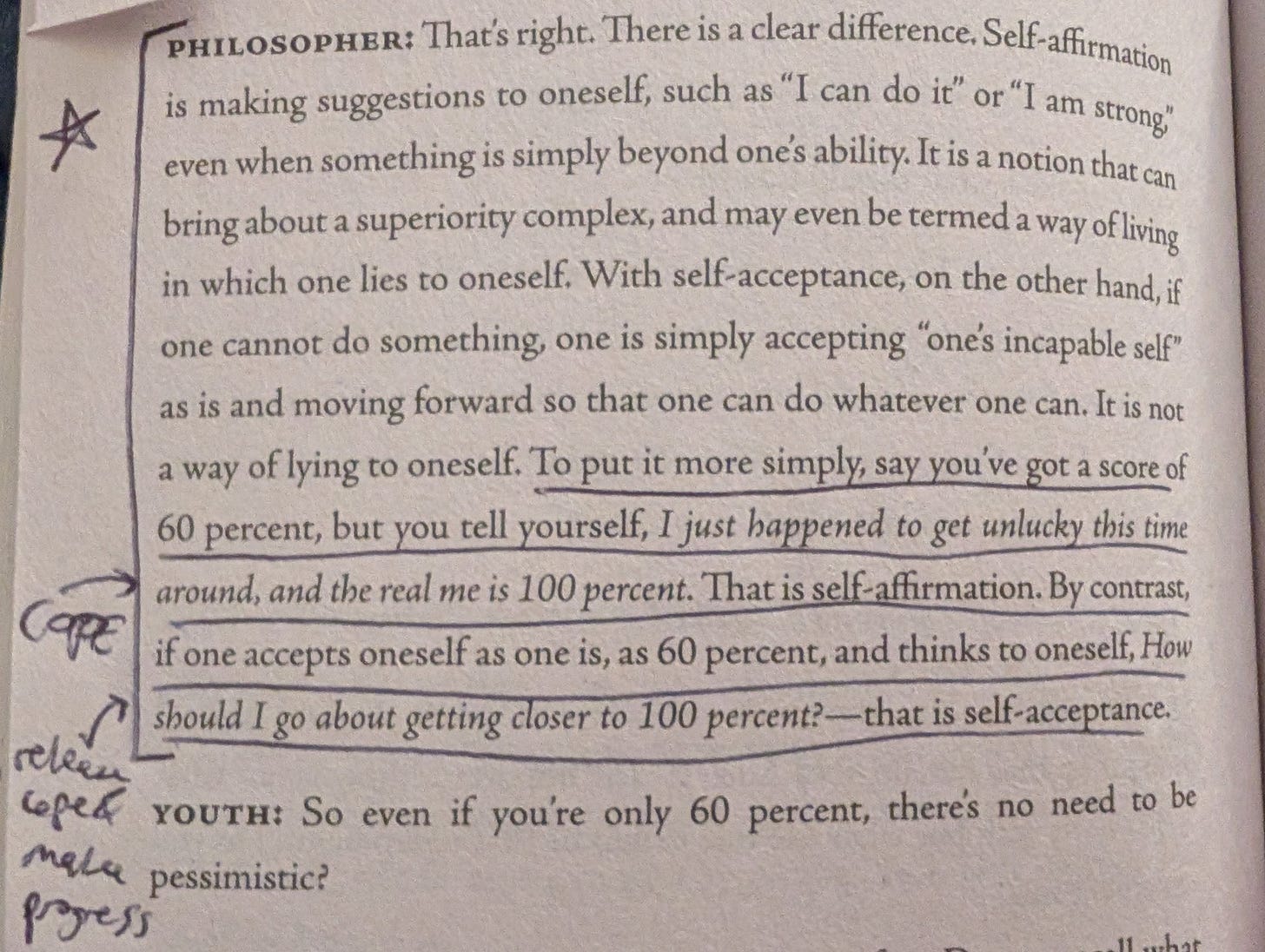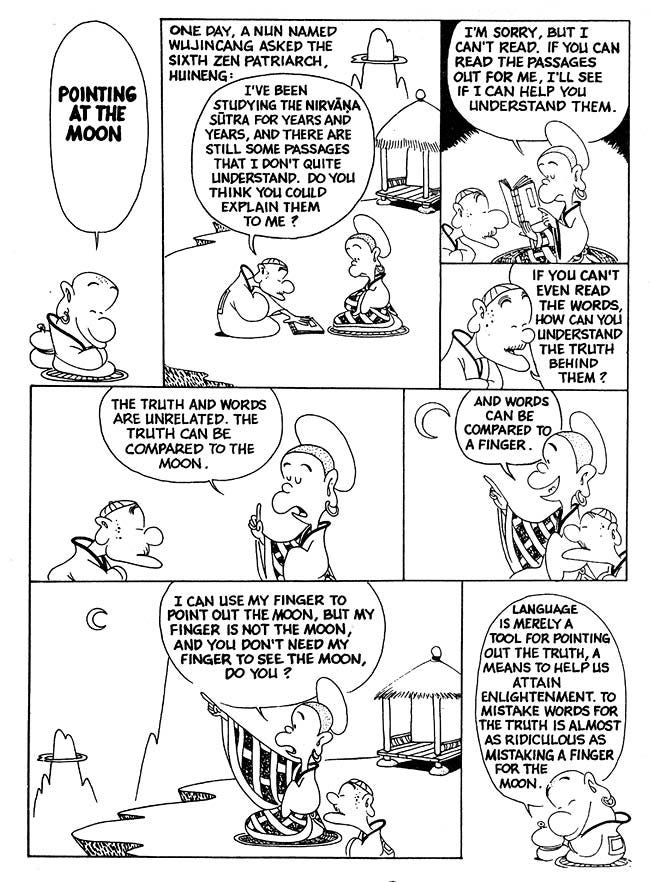Authenticity is one of those concepts that put a dent in people’s consciousness in the 2010s. In some random ad agency an intern finally managed to find a different way of saying “be yourself” that didn’t sound trite and cringe.
Yes, we should all strive to be ourselves; authentic in expression, demeanor, personality, relationships, emotions. It’s a simple task, easy enough, one that requires minimal effort to sustain the illusion that you’re actually doing it — it is an illusion after all because being authentic is impossible; all you can do is be courageously inauthentic.
The Man Wearing A Thousand Masks
I fear not the man who wears a thousand masks, but the man who wears just one.
Lacan was one of the first Western thinkers to subvert the concept of authenticity. He believed, contra Jung, that underneath the persona there’s more persona, more masks. He went as far as saying that the idea that we have a true self is in itself a fantasy we require in order to function. It is only through interacting with the imaginal layer that we may function as humans, otherwise we reduce every engagement with reality down to its bare mechanics; sex would become a rote push-pull movement that didn’t have the meaning of two more-than-bodies making a connection.
Ego, personality, the Real are “impossible categories” that represent some kind of organized space stuffing the imaginary so it doesn’t collapse without the inner structure. Zizek made the astute point that every time you believe that you are being inauthentic to your true feelings, you’re being authentic in denying them. Meaning is only found in the here and now; what we think of as the outer shell of our personality is far more stable and rich in meaning than the phantasmagorical symbolism of the subjectivity hidden in the “night of the world.”1
So, where does that leave you? Are you a phenomenon of codependent origination that has no enduring soul and thus can be and act any way it wants, a puppet to the whims of genetics, society, and cultural conditioning?
I couldn’t tell you. What’s for certain, however, is that if you do try to act as if you can possibly express your inner (true) self, you’ll fail from the standpoint of sensation. By sensation, I mean the alignment between your intention to express a genuine part of you and the corresponding mental and physical satisfaction from thinking you achieved that goal. You’ll get stuck in a cycle of perpetual rediscovery and rebuilding of the self; every few years you’ll get closer and closer… or at least it’ll feel like you’re getting closer and close only to take one more Zeno’s Microstep.
Instead, what you can do is replace the intention to be authentic with a different kind of meaning, that of earnestness.
Authenticity is a Sensation
Recently I posted the following on X:
It’s true that being relaxed and present is 80% of what constitutes sociability. But then, we tried to isolate the specific mechanics down to a handful of labels. For example, charisma, openness, and confidence. Do me a favor and look up the definition of these concepts — you might find them abstract, ineffable, or outright irrelevant to what’s the felt sensation of “relaxed and present”. Abstract enough so that you can begin projecting what you expect or what you think being social ought to be. My friend, you lost the referent! You’re chasing the concept (the corrupted concept) and not what the concept stands for.
Authenticity has had a similar faith. Instead of chasing the sensation that we arbitrarily call authenticity (more on that later), we chase the psychobabble —doing and behaving in ways that move us further away from the referent:
When we interact with others, we’re showing persona, we’re doing a performance that tries to signal an ideal or a socially desired profile (sneaky way the ego protects itself is by suppressing both positive and negative traits that don’t conform to this ideal). I’m not saying this isn’t true and that there isn’t a hefty dose of conditioning, no, but the moment you admit that the persona is fake, you automatically and by necessity jump to the conclusion that you’re being fake in the moment, and the sensation of authenticity will continue to elude you.
On the other hand, earnestness, sincerity, honesty are what lead to the Sensation of authenticity
Every time you, naturally, fail to align what you think are your real desires, qualities, personality traits, and inner world with what you express, you cause yourself to feel less safe. You start second-guessing every instinct and decision because it’s under scrutiny until the arbitrary moment everything will make sense automatically.
That’s never going to happen (probably).
But to express what you think and what you feel right now with genuine conviction is what most of us are actually seeking in the moment. It’s that sensation we’re chasing and we name it, arbitrarily, authenticity. It’s a lot more honorable to treat yourself in this way instead of imposing a perfect, impossible standard each waking moment.
Infinite Regression
We think of our Authentic Self as if it’s a part of us retreated from the world, hidden underneath many layers of unconscious goo but with the right procedure, it’ll emerge (and conveniently make you more successful and happy just because). The more we dig, the closer we think we are until we suddenly realize that we’re free-falling. There’s nothing wrong with exploration of course, as long as it’s not another way we try to hide from what’s in front of us.
Wittgenstein critiques that kind of introspectionism, the idea that we have privileged, infallible access to our own inner experiences. Our inner perceptions (sensation, thoughts, emotions) aren’t private objects per se that we can inspect at will, but rather shaped by linguistic and conceptual frameworks. We don’t “choose” what we perceive internally in the same way we choose between two external objects; instead, our self-awareness is conditioned by the forms of life and linguistic practices. Peter Hacker extends this critique by pointing out that introspection doesn’t function like an inner “gaze” directed at private experiences. We can of course perceive mental pictures and thoughts, but we’re actually self-selecting impressions of the inside. Our self-knowledge is not based on an unmediated internal observation2 but is structured by the ways we are taught to describe and understand experience.
Our authentic inner self is but another layer that satisfies our current egoic needs for a stable identity. Being “honest” in what you are right now3 and then accepting it will give you enough space and security to walk toward embodying something closer to reality as is.
Losing the Referent
When you load the concept of authenticity with a bunch of irrelevant stuff, you lose track of the right referent… and work on achieving a bunch of irrelevant stuff. This isn’t a new idea.
In Phaedrus, Plato (or more accurately, Socrates) takes issue with writing in the same way Baudrillard speaks of the simulacra4. Given that we already can't access the ideal form, the written word is thrice corrupted. The spoken word is corrupted once, the written word is corrupted twice; one because the memory of the writer fails us and two because we're interpreting the copy of someone's experience through our own experiences.
Edward Hall talks about extension transference in a similar way. Extensions are tools that help us interact with reality, but they can also obscure it, mistaking the extensions (like language or technology) for reality itself. The symbol becomes the referent.
So, if the concept of authenticity becomes corrupted, but you still think you’re after authenticity, the sensation will also become corrupted. And when sensation is corrupted, the body itself becomes corrupted, and your intuition will begin to fail you.
Instead, you can tap into being genuine and honest, even if it means feeling inauthentic, a fraud— at least you have the courage to be your fraud self! In the end, the search for authenticity is just another mask, but at least if you know that, you get to choose which one to wear and wear it genuinely.
Hegel's “night of the world” refers to the deep, unconscious realm of human subjectivity—the dark, chaotic, and formless aspect of self-consciousness before it attains rational structure. In the Lectures on the Philosophy of Spirit, he portrays it as an inner abyss where imagination, instincts, and raw potential dwell. It’s the pre-rational foundation of human thought, where individuals are both nothing (a void) and everything (infinite possibilities).
This is what Taoists believed when they rejected “names” (i.e. labels). Their concept of “Ting”, pure awareness, is another vehicle that pierces through the sixth sense, the mind, and can apprehend our inner world sans conceptual frameworks.
You don't possess yourself to the extent that you can't speak your mind. Someone once told me that he thought about all of the times during one day he bit his tongue, and that it was a revelation because he realized it was easier to count the times he did not during his entire life. What then happened in his private life? It's foolish to believe that this instinct hadn't become automatic, eventually affecting the trajectory of his destiny.
“But what if God himself can be simulated, that is to say can be reduced to signs that constitute faith? Then the whole system becomes weightless, it is no longer anything but a gigantic simulacrum - not unreal, but simulacrum, that is to say never exchanged for the real, but exchanged for itself, in an uninterrupted circuit without reference or circumference.”










Beautiful!
Interesting read